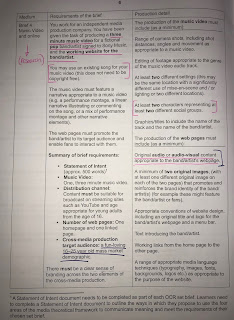THEORIES TO KEEP IN MIND DURING THE PROCESS OF CREATING MY PIECE
- RECEPTION THEORY: -
Nationwide audience - Different social/economic groups watched the same TV programme, interviews reveal different readings of the same text: -
Dominant (Hegemonic) reading: -Reader shares the encoded meanings of the text.
Negotiated reading: - Reader shares some of the embedded ideologies but not all
Oppositional (Counter-hegemonic) reading: - The reader does not share the programme's code and rejects the preferred reading.
-Members of the same subculture tend to decode text in the same way.
-Often the opposite to effects theories because it sees media consumption as active and not passive.
-The theory suggests that media texts are polysemic.
-Research examines social, cultural, economic, gender and sexuality as influence on the reading of media texts.
- SVEN E CARLSSON
Carlsson believes there are two categories that music videos can fall into – performance and conceptional. Performance videos are where the audience can watch the artist sign and dance eg: Side to side- Ariana Grande. On the other hand, conceptional videos are where the audience watch something other than the artist in the video eg: oceans- seafret. Carlsson created the theory that most performance movies make the performer not a performer anymore and that they are a materialisation of the commercial exhibitionist. This implies artists therefore are always restricted.
- ANDREW GOODWIN
-Andrew Goodwin believes there to be 5 main aspects to a music video that audiences look for: Star image, narrative, relation of visuals to song, technical aspects of the music video and thought beats.
Star Image – How the artist represents themselves through the video
Narrative – The storyline/progression of the piece
Relation of visuals to song - relationship from tone and lyrics to visual movement
Technical aspects of the music video – The type of shots etc
Thought beats – Involves three steps - firstly look at the music and interpret it, then find the ‘voice’ within the song and finally thinking about what ‘story’ is being told.



No comments:
Post a Comment